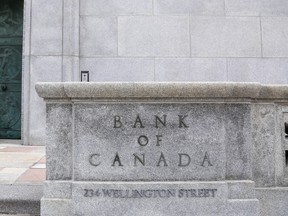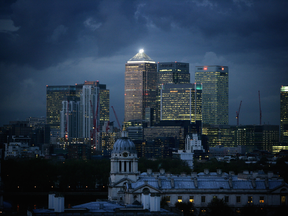One of the G20 walkouts on Russia, the Bank of Canada governor says the era of open trade is probably over
Article content
Bank of Canada Governor Tiff Macklem, who helped establish the G20 as the locus of economic co-ordination in the aftermath of the Great Recession, said Russia’s invasion of Ukraine has caused a rupture in the global order that probably is beyond repair.
Advertisement 2
Article content
“You are seeing a shift here,” said Macklem, who was among the officials who left the room when their Russian counterpart began his remarks at a gathering of G20 finance minsters and central bankers this week in Washington. “It is a bit difficult to predict where it goes,” he added, and then struggled to find a way to articulate what the new order might look like. “Let me put it this way,” he said. “We talk about open trade. I think we are going to be talking about open and secure trade now.”
That’s not the kind of trade Macklem was talking about in 2008 and 2009, when he was advising former prime minister Stephen Harper’s government on how to confront the financial crisis as the top economic diplomat at the Finance Department.
Advertisement 3
Article content
Macklem keeps a photo that was taken at the meeting in Washington in October 2008 when the G7 legacy powers realized they had lost their grip on the global financial system and would need the help of emerging powers such as China and Russia to help them reverse the crisis that Western bankers in New York and London had created.
“I’m in the picture and I look terrible,” Macklem told the Financial Post in December 2020. “I was pretty stressed. I keep that in my office as a little reminder of that feeling in the pit of your stomach.”
Finance ministers and central bankers from the G7, some middle powers such as Australia and South Korea, and bigger emerging markets such as Brazil and Indonesia had been meeting as the G20 for years. The financial crisis that followed the collapse of various investment banks in 2008 prompted former U.S. president George W. Bush to assemble G20 leaders. They organized a co-ordinated fiscal stimulus plan that averted a depression. Bush’s successor, Barack Obama, declared at a summit in Pittsburgh in 2009 that from that point forward, the G20 would be the “premier forum” for economic co-operation.
Advertisement 4
Article content
There was little co-ordination in Washington this week, at least among the big democracies that emerged triumphant after the Second World War and the autocracies that have grown rich enough in recent decades to chart their own courses. The camaraderie that existed during the Great Recession didn’t last long, and the G20 has been a non-entity during the pandemic. Russia’s brazen attack on Ukraine only broke an edifice that was already badly cracked.
Macklem defended the decision to protest Russia’s participation at the G20, which operates by consensus. The International Monetary Fund (IMF) this week cut its forecast for global economic growth almost entirely because the war has disrupted supply lines and exacerbated global inflation.
Advertisement 5
Article content
“We were discussing these issues with Russia at the table,” Macklem said on a video call with reporters. “It’s unacceptable. The very cause of this shock to the global economy was sitting at the table. That’s why a number of us left when Russia spoke. Obviously, we need peace. But we need countries to respect international law. If countries don’t respect international law, we’re not going to be able to work with them at the international table.”
It’s difficult to avoid the feeling that participants at this week’s meetings of the IMF and World Bank were participating in the end of an era. The period of globalization that began with the creation of the World Trade Organization in 1995 was supposed to make the world freer and richer. That appeared to be happening for a while, especially after China joined the WTO in 2001. Relatively small countries like Canada benefited from a set of rules that the world’s most powerful economies mostly agreed to follow. Vast middle classes began to form in countries such as China as trade helped lift hundreds of millions of people out of poverty.
Advertisement 6
Article content
But geopolitics got in the way. The United States and Europe refused to make room for China at the top of the IMF and the World Bank. Cold War animosities lingered. China’s leadership and Russian President Vladimir Putin demonstrated that they had agendas of their own. Emerging markets bristled at the West’s hypocrisy.
-

Tiff Macklem acknowledges that inflation is running hotter than he expected
-

Ukraine-Russia conflict to test resilience of global financial system: IMF
-

IMF slashes growth forecast as ‘seismic waves’ from Ukraine war sweeps over world
“It cannot be a unidimensional conversation about what is happening in Ukraine,” Mia Mottley, the prime minister of Barbados, said at an event hosted by the IMF on April 21 that also featured European Central Bank President Christine Lagarde and U.S. Federal Reserve Chair Jerome Powell, who were among the officials who participated in the G20 walkout. “We are totally sympathetic,” she said. “But what’s happening to the people of Tigray? What’s happening to the people in Yemen? What’s happening to the people elsewhere who are also on the verge of humanitarian crisis?”
Advertisement 7
Article content
Kristalina Georgieva, the managing director of the IMF, said it was too soon to “go buy a coffin for globalization.” Maybe so, but others struggled to be optimistic. Lagarde said Europe was “going to revisit” its commitment to a trading regime that put efficiency ahead of national interests. Powell conceded that globalization “may go into reverse,” a concern for central bankers, as such a reversal would almost certainly be inflationary.
Macklem appeared to be among the pessimists. An unabashed globalist who made his name on the international stage is preparing for a smaller world than the one he used to inhabit.
“If this persists, you will see a shift,” he said. “There is going to be increasing emphasis on trading and doing business only with countries that respect international law. We cannot be working with countries that do not respect international law.”
• Email: kcarmichael@postmedia.com | Twitter: carmichaelkevin
Advertisement
Russia’s invasion of Ukraine has caused a rupture in the global order that is probably beyond repair: Tiff Macklem
2022-04-22 13:14:39






